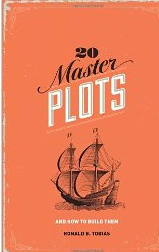Here’s the parts of “20 Master Plots and How To Build Them” by Ronald B. Tobias that I found most interesting. As always, if you like the quotes, please buy the book here.
 “Story, then, is a chronicle of events. The listener wants to know what comes next.
“Story, then, is a chronicle of events. The listener wants to know what comes next.
Plot is more than just a chronicle of events. THe listener asks a different question: “WHy does this happen?”
Story is a series of events strugn like beads on a string. (This happened and then this happened and then…)
Plot is a chain of cause-and-effect relationships that constantly create a pattern of unified action and behavior. Plot involves the reader in the game of “Why?”
Story requires only curiosity to know what will happen next.
Plot requires the ability to remember what has already happened, to figure out the relationships between events and people, and to try to project the outcome.” (12)
“Andre Gide pointed out that the first condition of art was that it contain nothing unessential.” (25)
“The true comic novel, Anthony Burgess pointed out, was the one that had to do with people’s recognition of their unimportance in the universe.” (36)
“The writer is a slave, not a god. You’re a slave to your characters and to the premise of your story. If you must find a model to represent the status of the author, it would be not as a god but as a referee.” (42)
“If you use your characters to say what you want them to say, you’re writing propaganda. If your characters say waht they want to say, you’re writing fiction.” (43)
“If you think it’s the author’s responsibility to tell the best story possible and not preach, you have little choice but ot present a situation that includes both sides of the argument sympathetically. Only then is your character between a rock and a hard place.” (46)
“As a writer, you aren’t concerned with teaching your reader the “right’ thing to do under these circumstances. You’re concerned with putting the reader in the shoes of your protagonist, making the reader “feel” for Sandy and understand the complexity of her dilemma, so the reader understands that there are no easy solutions and that someone, anyone, who has the misfortune to have this happen would suffer terribly.” (47)
“Mickey Spillane once said, “I have no fans. You know what I got? Customers.”” (117)
“We don’t identify with Judah Ben-Hur as strongly as we identify with the poor slob Rocky. Why not? Because Ben Hur is on a higher emotional and intellectual plane than most of us. We respect what he represents, but he isn’t really one of us. Rock is. He’s heroice in ways we can feel.” (132)
“If you want your reader to feel empathy for your protagonist, make sure that her emotional and/or intellectual plane is equal to or lower than the reader’s. If your reader feels your protagonist is superior, he won’t make the psychic connection. Part of this is vicarious; the reader wants your hero to be like him, at least symbolically. She’s no great genius, she’s a common person – someone your reader can relate to.” (132)
“The more a reader knows about the character, the less the character is a part of the reader’s world and more a part of his own world.” (173)
“You can’t just turn a character around 180 degrees and reverse her attitudes and actions by a simple event. You must show convincingly how the character could get from point A to point Z.” (196)
If you liked the quotes, please buy the book here.

